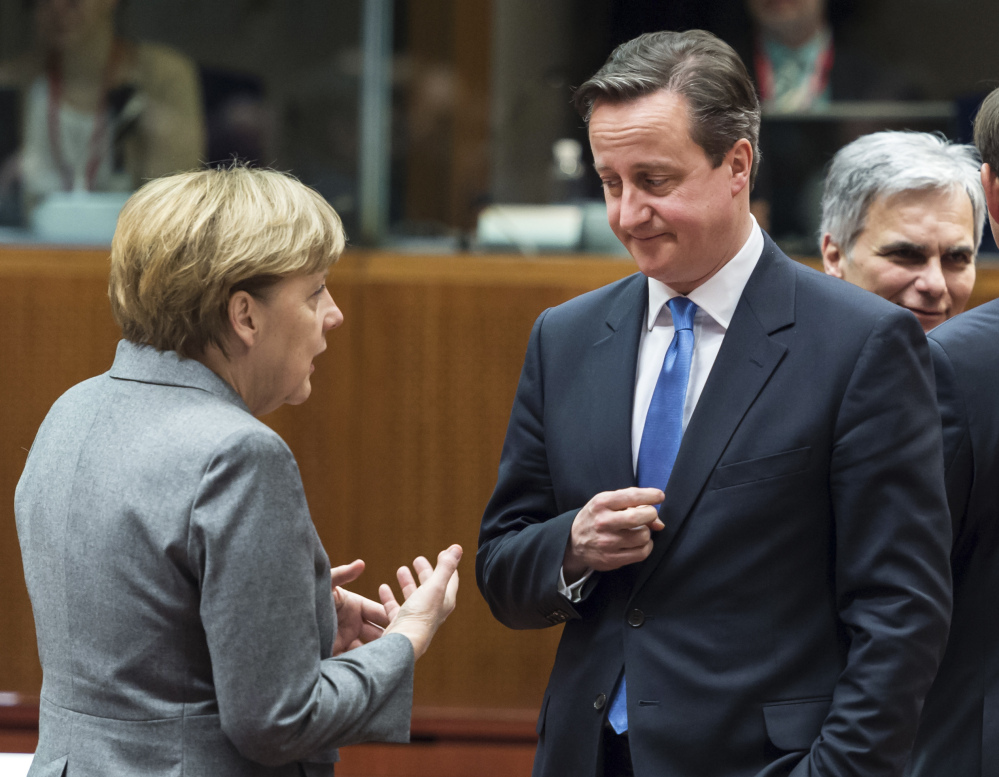MOSCOW — After two days of hard negotiations, the leaders of Russia, Ukraine, Germany and France announced Thursday that they had crafted a new peace plan for eastern Ukraine but the accord was met with skepticism over its power to end the war.
The four leaders worked Wednesday night into Thursday to get Russian and Ukrainian commitment to the plan that would halt hostilities within three days, require removal of heavy weaponry from the battle zones and restore Ukrainian control over its Russian border by late this year.
Russian President Vladimir Putin announced the agreement in a televised statement after the talks in Belarus. He hailed the plan’s promise of granting greater autonomy to separatist-occupied regions of eastern Ukraine but made no mention of its omission of a key Kremlin demand that Ukraine be transformed into a loose federation with a weakened central government in Kiev.
“We now have a glimmer of hope,” German Chancellor Angela Merkel said of the plan, reflecting the general caution of its brokers, who have seen other cease-fires fall apart. “But the concrete steps, of course, have to be taken. And we will still face major obstacles. But, on balance, I can say what we have achieved gives significantly more hope than if we had achieved nothing.”
The deal was negotiated under the pressure of an emerging campaign among U.S. foreign policy officials to send arms to the Ukrainian government to help its troops put down the insurgency by Russia-backed separatists. The rebels have taken control of two sprawling regions on the Russian border, Donetsk and Luhansk, and Russia has overtly seized Ukraine’s Crimea region.
The Obama administration welcomed the agreement as “a potentially significant step toward a peaceful resolution of the conflict and the restoration of Ukraine’s sovereignty.” But the White House said the deal needed “immediate, concrete steps to fulfill the commitments by all parties.”
Artillery exchanges continued in eastern Ukraine on Thursday, the National Defense and Security Council in Kiev reported. Council spokesman Andriy Lysenko also said that Russia sent another 50 tanks and a dozen heavy guns into rebel-held territory overnight as the peace talks were under way.
Putin said the accord contained a provision “of extreme importance” that heavy weaponry be withdrawn from the current line of confrontation by Ukrainian government forces and that separatists pull back from the demarcation line that was identified five months ago. That would leave a broad no-man’s land, as the separatists have gained ground since the Sept. 19 front line was fixed, offering an alluring incentive for both sides to move in and take it.
Copy the Story LinkSend questions/comments to the editors.



Success. Please wait for the page to reload. If the page does not reload within 5 seconds, please refresh the page.
Enter your email and password to access comments.
Hi, to comment on stories you must . This profile is in addition to your subscription and website login.
Already have a commenting profile? .
Invalid username/password.
Please check your email to confirm and complete your registration.
Only subscribers are eligible to post comments. Please subscribe or login first for digital access. Here’s why.
Use the form below to reset your password. When you've submitted your account email, we will send an email with a reset code.